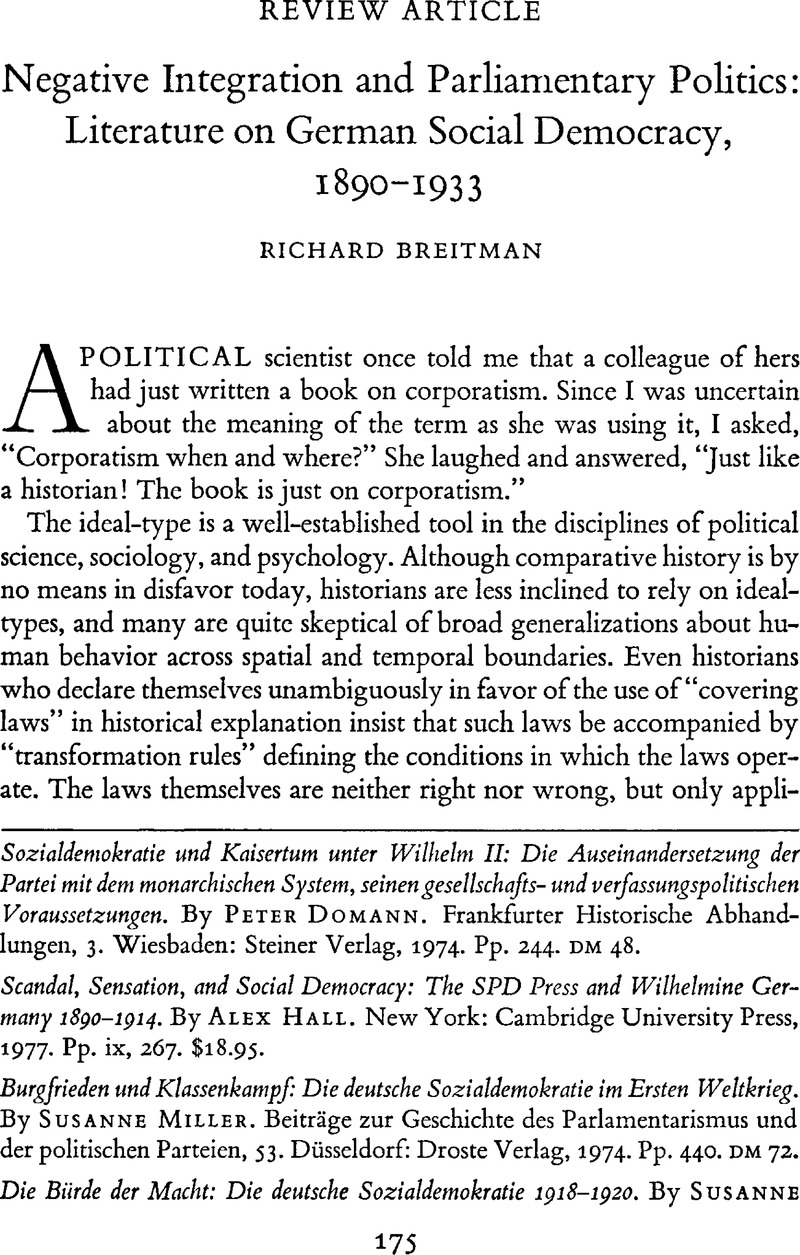No CrossRef data available.
Article contents
Negative Integration and Parliamentary Politics: Literature on German Social Democracy, 1890–1933
Published online by Cambridge University Press: 16 December 2008
Abstract

- Type
- Review Article
- Information
- Copyright
- Copyright © Conference Group for Central European History of the American Historical Association 1980
References
1. See Lichtman, Allan J. and French, Valerie, Historians and the Living Past (Arlington Heights, Ill., 1978), pp. 58–59.Google Scholar
2. The best treatment of the SPD during the period of antisocialist legislation is still Lidtke, Vernon L., The Outlawed Party: Social Democracy in Germany 1878–1890 (Princeton, 1966).Google Scholar
3. Michels, Robert, Zur Soziologie des Parteiwesens in der modernen Demokratie (Leipzig, 1910)Google Scholar; translated edition (from which all page numbers are taken) is Political Parties: A Sociological Study of the Oligarchical Tendencies of Modern Democracy, trans. Eden, and Paul, Cedar (New York, 1915).Google Scholar
4. Schorske, Carl E., German Social Democracy 1905–1917: The Development of the Great Schism (Cambridge, Mass., 1955).Google Scholar
5. On the USPD, see the excellent study by Morgan, David W., The Socialist Left and the German Revolution: A History of the German Independent Social Democratic Party 1917–1922 (Ithaca, 1975).Google Scholar
6. Hunt, Richard N., German Social Democracy 1918–1933 (New Haven, 1964).Google Scholar
7. Neumann, Sigmund, Die politischen Parteien in Deutschland (Berlin, 1932).Google Scholar
8. Landauer's, Carl review of Hunt's German Social Democracy in Journal of Modern History 37 (1965): 113–14.Google Scholar
9. Roth, Guenther, The Social Democrats in Imperial Germany: A Study in Working-Class Isolation and National Integration (Totowa, N.J., 1963).Google Scholar
10. Groh, DieterNegative Integration und Revolutionärer Attentismus: Die deutsche Sozialdemokratie am Vorabend des Ersten Weltkrieges (Frankfurt a.M., 1973).Google Scholar
11. See Steinberg, Hans-Josef, Sozialismus und deutsche Sozialdemokratie: Zur Ideologie der Partei vor dem Ersten Weltkrieg (Hanover, 1967), p. 67.Google Scholar
12. Herwig, Holger H., in Central European History 10 (1977): 176–77.CrossRefGoogle Scholar
13. The standard work here is Ritter, Gerhard A., Die Arbeiterbewegung im Wilhelminischen Reich: Die Sozialdemokratische Partei und die freien Gewerkschaften 1890–1900 (Berlin, 1959).Google Scholar
14. I am informed that David Schoenbaum of the University of Iowa will soon publish a study of the Zabern Affair.
15. Fontane, Theodor, Jenny Treibel (New York, 1976), p. 166Google Scholar; the original German edition was published in 1892.
16. Nettl, J. P., “The German Social Democratic Party 1890–1914 as a Political Model,” Past and Present 30 (1965): 66.Google Scholar
17. The speeches of Philipp Scheidemann and Otto Landsberg at the SPD congress in 1917 indicate that leading Social Democrats expected the SPD to give up its opposition role once a parliamentary system of government was implemented after the war. Protokoll über die Verhandlungen des Parteitages der Sozialdemokratischen Partei Deutschlands, abgehalten in Würzburg (Berlin, 1917), pp. 137–38, 406–7.Google Scholar
18. An omission is the very useful collection of documents by Emmerich, Wolfgang, ed., Proletarische Lebensläufe: Autobiographische Dokumente zur Entstehung der Zweiten Kultur in Deutschland, 2 vols. (Hamburg, 1975).Google Scholar
19. James C. Hunt has already assessed Schustereit's treatment of the DDP; see “The Bourgeois Middle in German Politics, 1871–1933: Recent Literature,” Central European History 11 (1978): 98.Google Scholar
20. In actuality, the SPD began negotiations with the DDP before it even discussed the possibility of an invitation to the USPD. See Protokoll der SPD Reichstagsfraktionssitzungen, Feb. 4, 1919, 10:30 A.M. and 4 P.M. (International Institute of Social History, Amsterdam).
21. The Socialist Workers' Party (SAPD) was not in existence at the time that Hermann Müller's Great Coalition government collapsed, and the SPD congress in 1929 was held in Magdeburg, not Marburg (p. 57). The date of the 1930 Reichstag election was September 14, not September 19 (p. 59).
22. Woytinsky, Wladimir S., Stormy Passage (New York, 1961).Google Scholar
23. This is an area in which new evidence and new interpretations have come to light since the publication of Schneider's book. See Skrzypczak, Henryk, “Fälscher machen Zeitgeschichte: Ein quellenkritischer Beitrag zur Gewerkschaftspolitik in der Ära Papen und Schleicher,” Internationale Wissenschaftliche Korrespondenz zur Geschichte der deutschen Arbeiterbewegung (hereafter cited as IWK) 11 (1975): 452–71Google Scholar; Emig, Dieter und Zimmermann, Rüdiger, “Das Ende einer Legende: Gewerkschaften, Papen und Schleicher, gefälschte und echte Protokolle,” IWK 12 (1976): 19–43Google Scholar; Breitman, Richard, “On German Social Democracy and General Schleicher 1932–33,” Central European History 9 (1976): 352–78.CrossRefGoogle Scholar
24. Gates, Robert A., “German Socialism and the Crisis of 1929–1933,” Central European History 7 (1974): 332–59.CrossRefGoogle Scholar See also Gates's unpublished dissertation, “The Economic Policies of the German Free Trade Unions and the German Social Democratic Party, 1930–1933” (University of Oregon, 1970)Google Scholar.
25. Among the primary sources, particularly worthy of note are Wagner, Helmut, “Organisation und Klasse,” in Die Organisation im Klassenkampf: Die Probleme der politischen Organisation der Arbeiterklasse (Berlin, n.d. [1931])Google Scholar; Gurland, A. and Laumann, K., Spaltung oder Aktivität? (Berlin, 1931)Google Scholar; and Sollmann, Wilhelm, “Positive Parteikritik: Erneurung und Machtwille,” Neue Blätter für den Sozialismus 4 (1933): 25–33.Google Scholar For a useful analysis of the whole debate about Social Democratic leadership at the end of the Weimar Republic, see Skrzypczak, Henryk, “Führungsprobleme der sozialistischen Arbeiterbewegung in der Endphase der Weimarer Republik,” in Herkunft und Mandat: Beiträge zur Führungsproblematik in der Arbeiterbewegung (Frankfurt a.M., 1976), pp. 128–47.Google Scholar
26. Niewyk, Donald L., Socialist, Anti-Semite, and Jew: German Social Democracy Confronts the Problem of Anti-Semitism, 1918–1933 (Baton Rouge, 1971), pp. 217–18.Google Scholar
27. This is quite evident in the meetings of the Parteivorstand and Parteiausschuss in late 1932 and January 1933. See Schulze, Hagen, ed., Anpassung oder Widerstand? Aus den Akten des Parteivorstands der deutschen Sozialdemokratie 1932/33 (Bonn–Bad Godesberg, 1975).Google Scholar




